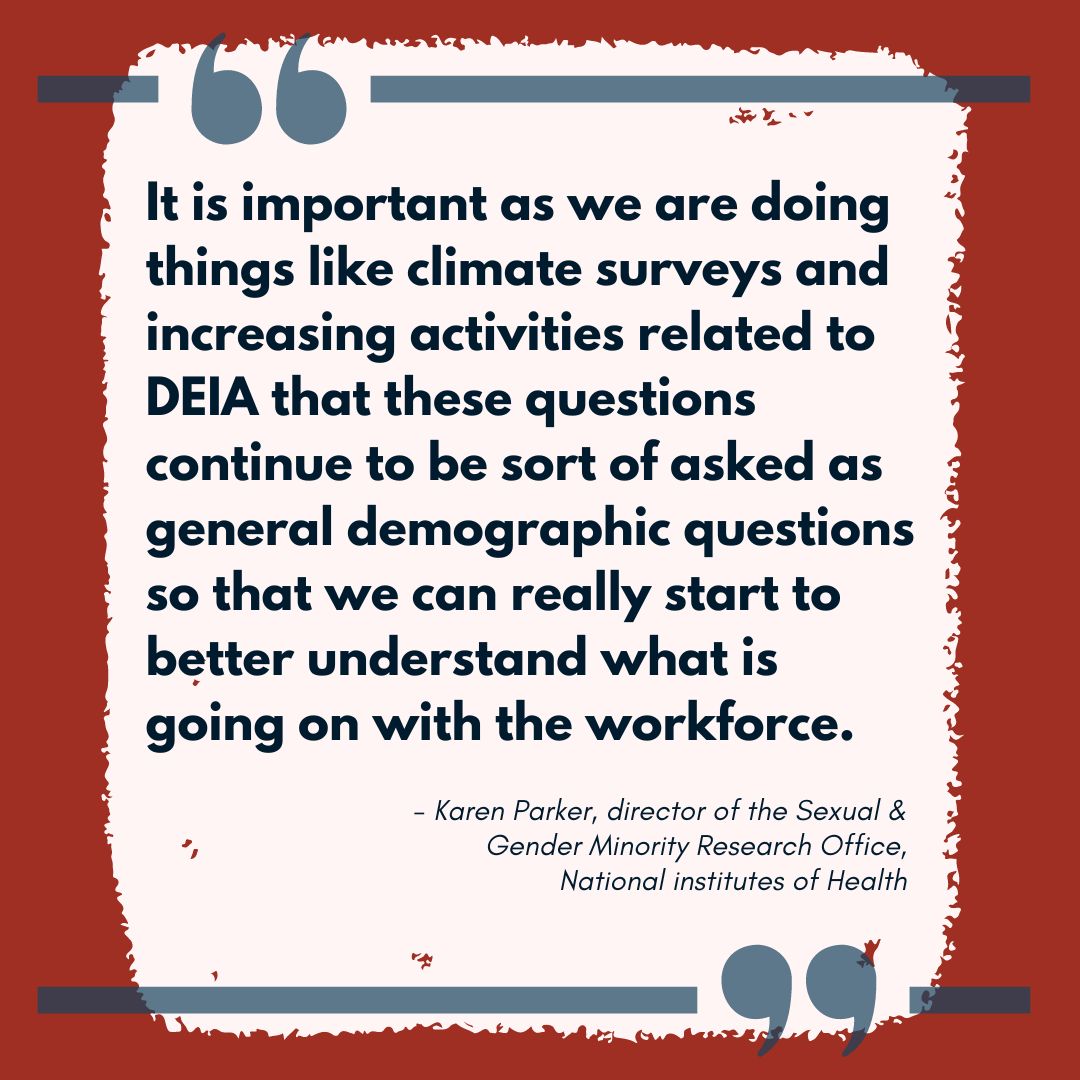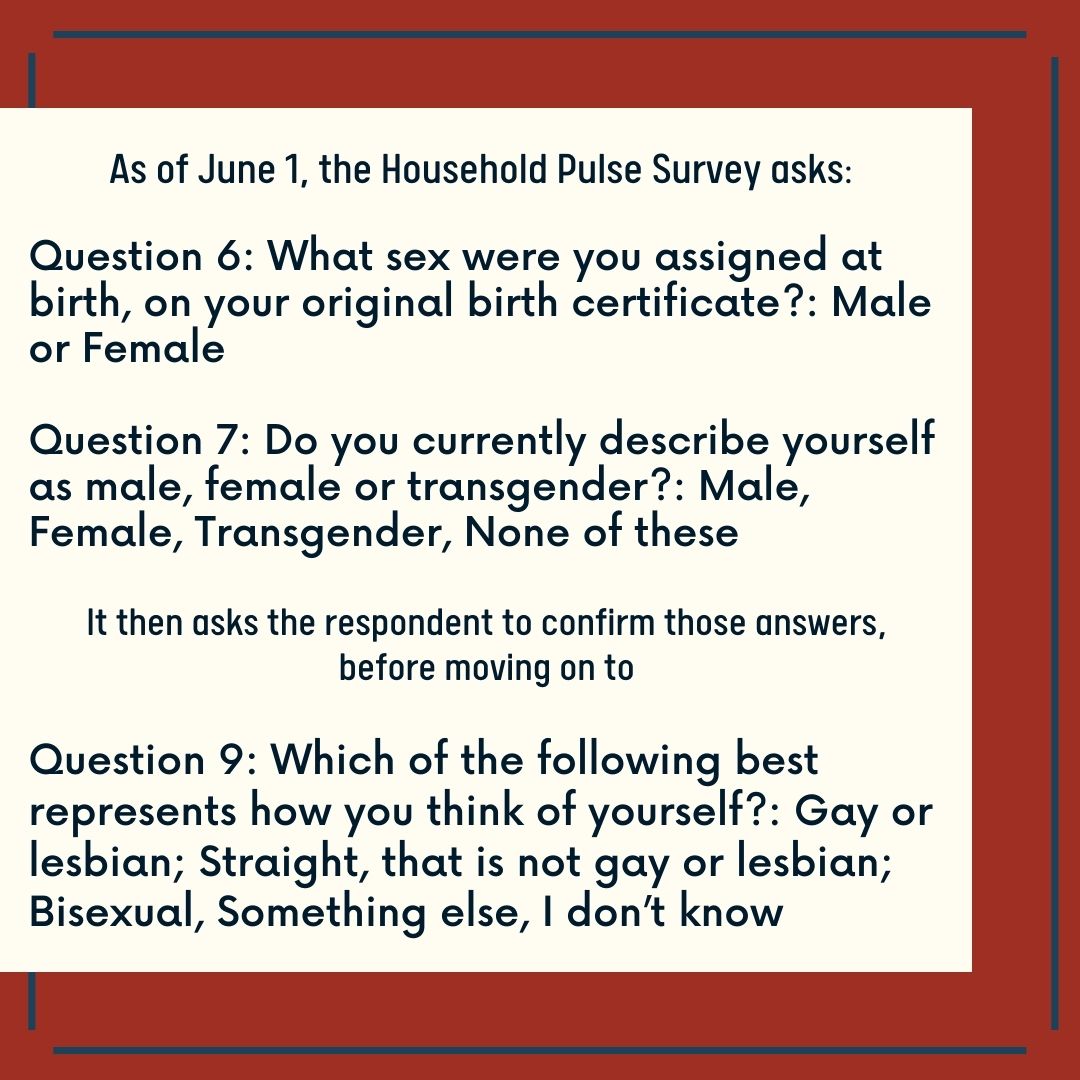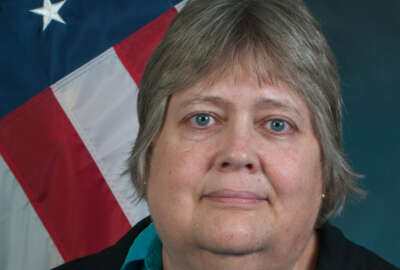
White House wants agencies to increase, improve collection of LGBTQ data
Federal data experts say decades of research on sexual orientation and gender identity can point agencies in the right direction on including LGBTQ populations in...
Best listening experience is on Chrome, Firefox or Safari. Subscribe to Federal Drive’s daily audio interviews on Apple Podcasts or PodcastOne.
The federal government collects myriad forms of demographic data, but it could do more around sexual orientation and gender identities. In line with his administration’s broader diversity, equity, inclusion and accessibility goals President Joe Biden is directing agencies to see where they can expand collection of LGBTQ data.
Biden’s June 15 executive order on “Advancing Equality for Lesbian, Gay, Bisexual, Transgender, Queer, and Intersex Individuals,” instructs the Interagency Working Group on Equitable Data at the Office of Management and Budget to establish a subcommittee on sexual orientation, gender identity and sex characteristics data to coordinate with agencies. The group is supposed to release an evidence agenda by October, which should highlight disparities faced by LGBTQ individuals that could benefit from federal statistics and data collection.
This EO was signed a day after the House passed the LGBTQI+ Data Inclusion Act, which says agencies that “publish reports relying on survey demographic data must include information on sexual orientation and gender identity.” The bill went to the Senate Committee on Homeland Security and Governmental Affairs on Monday.
Lucky for the Interagency Working Group on Equitable Data, they do not have to start from scratch.
When the Census Bureau was considering adding questions about sexual orientation and gender identity (SOGI) to the experimental Household Pulse Survey in 2020, an Interagency Technical Working Group on Sexual Orientation and Gender Identity, also at OMB, released a report with recommendations for how to do so.
One member of that group was Jennifer Ortman, a Census Bureau demographer and co-chair of the Federal Committee on Statistical Methodology’s Measuring Sexual Orientation and Gender Identity Research Group. She recalled multiple agencies were interested in the idea.
“I’m not sure who brought up the topic initially, but it was certainly a topic that I believe there is wide support [for] and my understanding was that various agencies understood both the importance and the potential value of adding these questions,” Ortman said.
Nancy Potok, former chief statistician of the United States, said the Interagency Technical Working Group on Sexual Orientation and Gender Identity set a good precedent. She said the new Equitable Data working group subcommittee should include people with a working-level understanding of data collection, and people who understand SOGI sensitivities.
Aside from the Household Pulse Survey, SOGI data has long been included in the National Health Interview Survey for the Centers for Disease Control and Prevention, as well as in the National Crime Victimization Survey at the Justice Department. Current and former federal data experts said these established efforts, plus decades of SOGI research from academic and nonprofit institutions, are enough to point agencies in the right direction on expanding data collection for LGBTQ populations.
 Retired Census Bureau senior methodologist Nancy Bates said it’s not only feasible for more agencies to start collecting SOGI data, it’s also crucial.
Retired Census Bureau senior methodologist Nancy Bates said it’s not only feasible for more agencies to start collecting SOGI data, it’s also crucial.
“So [it’s] super important for policymakers to understand if we don’t collect the data we can’t make any inferences about this population,” Bates said.
Karen Parker, director of the Sexual & Gender Minority Research Office at the National institutes of Health, said if the Biden administration hopes to enact not only the June 15 executive order but previous EOs pertaining to LGBTQ individuals and equity, having this data is important.
“One of the other, I think, really important areas of data collection that many government agencies are interested in is attempting to better understand the government workforce … to do barrier analyses to understand if there are challenges related to hiring or retention or promotion within the workforce,” Parker said. “Certainly some questions are asked in the [Federal Employee Viewpoint Survey] and so it is important as we are doing things like climate surveys and increasing activities related to DEIA that these questions continue to be asked as general demographic questions so that we can really start to better understand what is going on with the workforce.”
Choosing the right words
When collecting SOGI data, question design and filtering are paramount. Picking appropriate terms, and giving respondents the option to not answer, impact the overall response rates.
Recommendations in a report by the National Academies of Sciences, Engineering and Medicine released in March include exact question wording and filtering or skip options on general population surveys. Although the report was done for the National Institutes of Health, Parker hoped it could lead to more consistency among federal surveys. The report committee included members of the LGBTQ community, and some of its recommendations were:
- For sexual orientation identity, ask “Which of the following best represents how you think of yourself?”: straight, gay/lesbian, bisexual, two-spirit, don’t know or prefer not to answer, and a free response option.
- For gender identity, a two-step method: “What sex were you assigned at birth, on your original birth certificate?”: female, male, don’t know or prefer not to answer. That is followed by, “What is your current gender? [Mark only one]”: female, male, transgender, two-spirit, don’t know or prefer not to answer, and a free response option.
Research showed these options cover, and are understood by, most of the population but testing was limited to English and Spanish speakers. The more narrow and technical the survey language, the less likely respondents are to understand or answer. More specific community questionnaires could use more targeted response options, the report said.
Question wording can change over time as the understanding around identities evolves, not unlike how the Census Bureau has altered its categories of race and ethnicity over time. But the data can still prove useful, and federal data collectors are advised to phrase their questions for the population they want to capture.
Bianca Wilson, a co-author on the report and a senior scholar of Public Policy at the Williams Institute at UCLA, recommended agencies have confidence in the research field which has been asking SOGI questions for a long time, with established measures and a history of testing for comprehension, visibility, error rates for accuracy — like they already do for some questions “we take for granted,” such as age.
Ortman and her colleague Thomas File, senior sociologist for the Social Characteristics Research Area at the Census Bureau, said adding SOGI questions to the Household Pulse Survey did not change response rates in any meaningful way. They and others agreed that, historically, the types of questions that get the lowest response rates are around personal income levels.
As Bates, the retired methodologist put it, “People are much less likely to tell you how much they make than to tell you whether they’re straight or gay.”
Census demonstrates benefits of agile survey design
The Household Pulse Survey launched in April 2020 to measure the economic impact of the pandemic, and it is unique in several ways. It was the first Census Bureau-sponsored survey to ask SOGI questions, it is administered online or over the phone.  File said Phase 3.5 data collection remains on track to end on Aug. 8, with the final data release on Aug. 17. Respondents are contacted only by email or mobile device, data is collected in two week spurts and released continuously. File said Census then meets with their federal agency partners at the end of each collection phase to reevaluate and make any changes so that the survey “remains as relevant as possible during a clearly ongoing pandemic.”
File said Phase 3.5 data collection remains on track to end on Aug. 8, with the final data release on Aug. 17. Respondents are contacted only by email or mobile device, data is collected in two week spurts and released continuously. File said Census then meets with their federal agency partners at the end of each collection phase to reevaluate and make any changes so that the survey “remains as relevant as possible during a clearly ongoing pandemic.”
The survey also does not use proxy reporting, meaning respondents answer only for themselves and not for others in their household.
“Ability or willingness of household respondents to respond to SOGI questions for other household members is of central concern as we consider fielding these questions on household surveys with proxy response,” the National Academies report said. “In addition, given that some [sexual and gender minority] individuals are not always open about their identities with household members, the issue of accuracy of proxy reports is always a consideration for reporting purposes.”
Ortman said that in 2021, agency partners decided to expand the survey’s demographics to include sexual and gender minorities because of known health care and economic disparities for these groups.
“Obviously the pandemic has not unfolded in a predictable fashion and I think it’s been really critical for us to have this agile survey tool capable of changing alongside the pandemic. So the flexibility has certainly been built into it from the beginning,” File said. “Having said all of that, I think it’s also really important to stress that on all of our surveys, whether they’re experimental in nature or otherwise, they all have to follow a process and OMB standards.”
Data privacy expected to work the same for SOGI
Hanging over all of this is the omnipresent security factor: How should agencies ensure SOGI data is protected and does not put individuals at risk personally or professionally? But at least as far as cybersecurity is concerned, data experts and SOGI researchers have not flagged any unique considerations that stakeholders should be aware. The fundamental rules apply.
What might need a closer look, however, is how researchers account for surveying people with varying levels of “outness” about their identity, particularly LGBTQ youth. Once again, Wilson, who researches LGBTQ youth in foster care, said to look at existing evidence for answers. But most of the testing with SOGI data has been in survey settings; it’s with the non-survey-based, administrative data that Wilson said the privacy measure needs more thought.
“We need more data on sexual orientation and gender identity in applications for employment or applications for food benefits, like SNAP and whatever that looks like in each state. And those kinds of administrative data do have the challenges, because research has not yet shown whether there are privacy concerns or threats to discrimination, if people disclose their SOGI or disclose their LGBT status on those applications,” she said. “So I think there’s two parts of this: We need to better understand whether there are threats to privacy and potential vulnerabilities to disclosing LGBT status on benefits of patients through federal agencies, or state based agencies. But we need to have the expectation that we don’t withhold asking that information, knowing that discrimination occurs. We should be holding all of these agencies to the same standards with regard to SOGI data that we expect of them for all the other private information that they collect.”
Copyright © 2025 Federal News Network. All rights reserved. This website is not intended for users located within the European Economic Area.
Amelia Brust is a digital editor at Federal News Network.
Follow @abrustWFED





